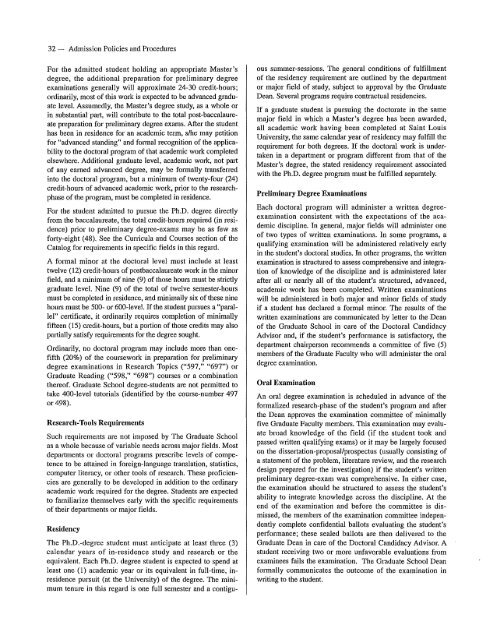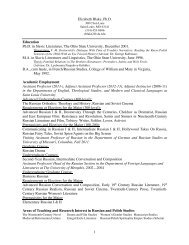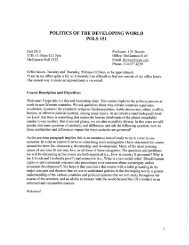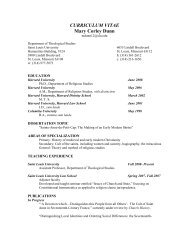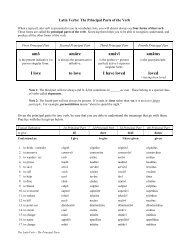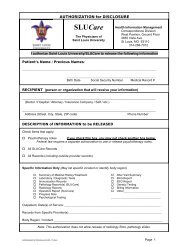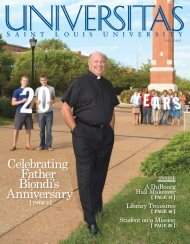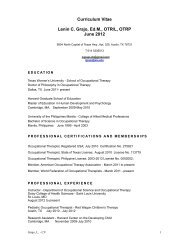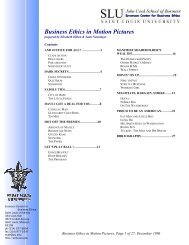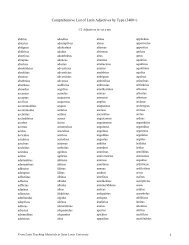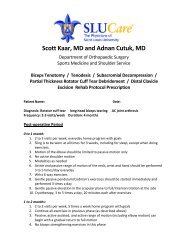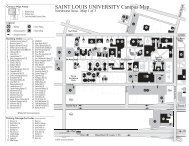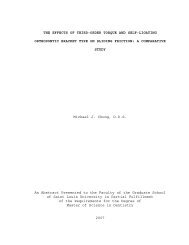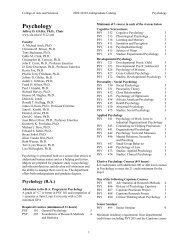Program Manual - Saint Louis University
Program Manual - Saint Louis University
Program Manual - Saint Louis University
You also want an ePaper? Increase the reach of your titles
YUMPU automatically turns print PDFs into web optimized ePapers that Google loves.
32 - Admission Policies and Procedures<br />
For the admitted student holding an appropriate Master's<br />
degree, the additional preparation for preliminary degree<br />
examinations generally will approximate 24-30 credit-hours;<br />
ordinarily, most of this work is expected to be advanced graduate<br />
level. Assumedly, the Master's degree study, as a whole or<br />
in substantial part, will contribute to the total post-baccalaureate<br />
preparation for preliminary degree exams. After the student<br />
has been in residence for an academic term, slhe may petition<br />
for "advanced standing" and formal recognition of the applicability<br />
to the doctoral program of that academic work completed<br />
elsewhere. Additional graduate level, academic work, not part<br />
of any earned advanced degree, may be formally transferred<br />
into the doctoral program, but a minimum of twenty-foul' (24)<br />
credit-hours of advanced academic work, prior to the researchphase<br />
of the program, must be completed in residence.<br />
For the student admitted to pursue the Ph.D. degree directly<br />
from the baccalaureate, the total credit-hours required (in residence)<br />
prior to preliminary degree-exams may be as few as<br />
forty-eight (48). See the Curricula and Courses section of the<br />
Catalog for requirements in specific fields in this regard.<br />
A formal minor at the doctoral level must include at least<br />
twelve (12) credit-hours of postbaccalaureate work in the minor<br />
field, and a minimum of nine (9) of those hours must be strictly<br />
graduate level. Nine (9) of the total of twelve semester-hours<br />
must be completed in residence, and minimally six of these nine<br />
hours must be 500- or 600-level. If the student pursues a "parallel"<br />
certificate, it ordinarily requires completion of minimally<br />
fifteen (15) credit-hours, but a p0l1ion of those credits may also<br />
partially satisfy requirements fol' the degree sought.<br />
Ordinarily, no doctoral program may include more than onefifth<br />
(20%) of the coursework in preparation for preliminary<br />
degree examinations in Research Topics ("597," "697") or<br />
Graduate Reading ("598," "698") courses or a combination<br />
thereof. Graduate School degree-students are not permitted to<br />
take 400-1evel tutorials (identified by the course-number 497<br />
or 498).<br />
Research-Tools Requirements<br />
Such requirements are not imposed by The Graduate School<br />
as a whole because of variable needs across major fields. Most<br />
depm1ments or doctoral programs prescribe levels of competence<br />
to be attained in foreign-language translation, statistics,<br />
computer literacy, or other tools of resem'ch. These proficiencies<br />
are generally to be developed in addition to the ordinary<br />
academic work required for the degree. Students are expected<br />
to familim'ize themselves em'ly with the specific requirements<br />
of their depmtments or major fields.<br />
Residency<br />
The Ph.D.-degree student must anticipate at least three (3)<br />
calendar years of in-residence study and research or the<br />
equivalent. Each Ph.D, degree student is expected to spend at<br />
least one (1) academic year or its equivalent in full-time, inresidence<br />
pursuit (at the <strong>University</strong>) of the degree. The minimum<br />
tenure in this regard is one full semester and a contigu-<br />
ous summer-sessions. The general conditions of fulfillment<br />
of the residency requirement are outlined by the department<br />
01' major field of study, subject to approval by the Graduate<br />
Dean. Several programs require contractual residencies.<br />
If a graduate student is pursuing the doctorate in the same<br />
major field in which a Master's degree has been awarded,<br />
all academic work having been completed at <strong>Saint</strong> <strong>Louis</strong><br />
<strong>University</strong>, the same calendar year of residency may fulfill the<br />
requirement for both degrees. If the doctoral work is undertaken<br />
in a department or program different from that of the<br />
Master's degree, the stated residency requirement associated<br />
with the Ph.D. degree program must be fulfilled separately.<br />
Preliminary Degree Examinations<br />
Each doctoral program will administer a written degreeexamination<br />
consistent with the expectations of the academic<br />
discipline. In general, major fields will administer one<br />
of two types of written examinations. In some programs, a<br />
qualifying examination will be administered relatively early<br />
in the student's doctoral studies. In other programs, the written<br />
examination is structured to assess comprehensive and integration<br />
of knowledge of the discipline and is administered later<br />
after all or nearly all of the student's structured, advanced,<br />
academic work has been completed. Written examinations<br />
will be administered in both major and minor fields of study<br />
if a student has declared a formal minor. The results of the<br />
written examinations are communicated by letter to the Dcan<br />
of the Graduate School in care of the Doctoral Candidacy<br />
Advisor and, if the student's pelformance is satisfactory, the<br />
department chaiIperson recommends a committee of five (5)<br />
members of the Graduate Faculty who will administer the oral<br />
degree examination.<br />
Oral Examination<br />
An oral degree examination is scheduled in advance of the<br />
formalized research-phase of the student's program and after<br />
the Dean approves the examination committee of minimally<br />
five Graduate Faculty members. This examination may evaluate<br />
broad knowledge of the field (if the student took and<br />
passed written qualifying exams) or it may be largely focused<br />
on the disse11ation-proposal/prospectus (usually consisting of<br />
a statement of the pl'Oblem, literature review, and the research<br />
design prepared for the investigation) if the student's written<br />
preliminary degree-exam was comprehensive. In either case,<br />
the examination should be structured to assess the student's<br />
ability to integrate knowledge across the discipline. At the<br />
end of the examination and before the committee is dismissed,<br />
the members of the examination committee independently<br />
complete confidential ballots evaluating the student's<br />
performance; these sealed ballots are then delivered to the<br />
Graduate Dean in care of the Doctoral Candidacy Advisor. A<br />
student receiving two or more unfavorable evaluations from<br />
examinees fails the examination. The Graduate School Dean<br />
formally communicates the outcome of the examination in<br />
writing to the student.


